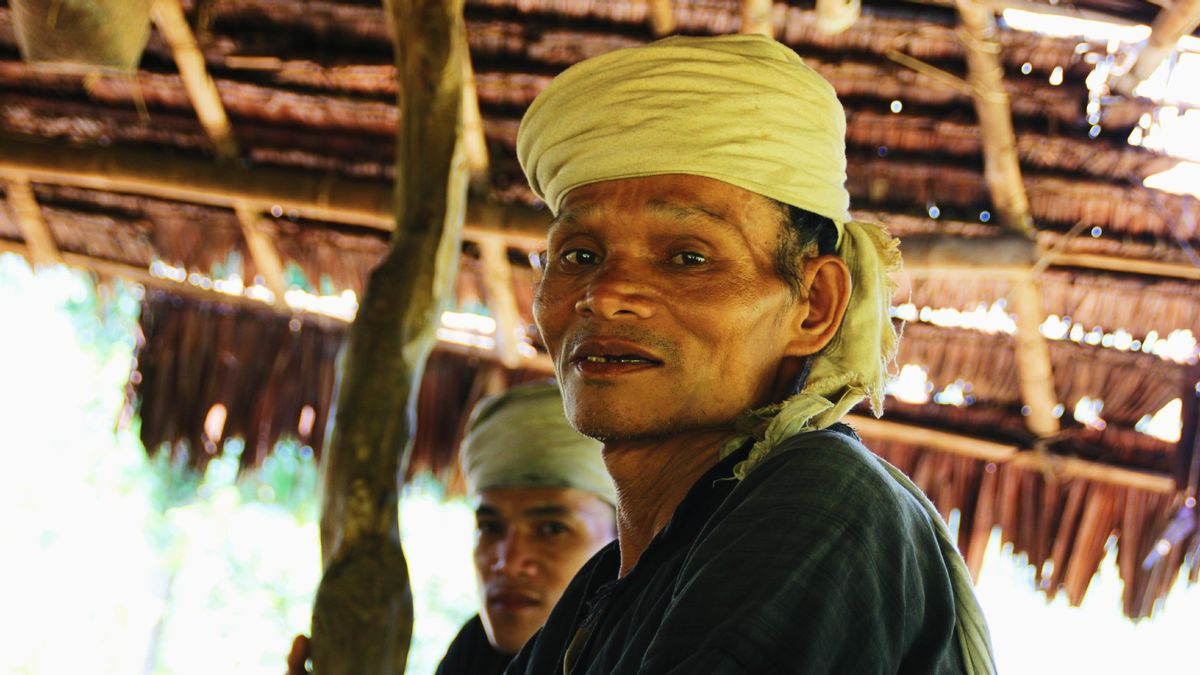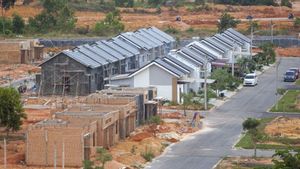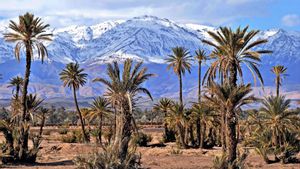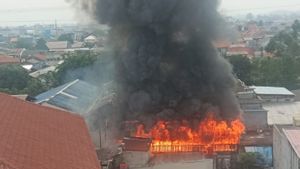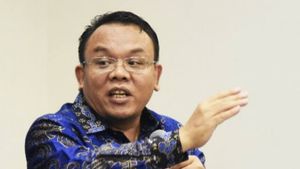JAKARTA - In the midst of encouraging the government to restore tourism, a letter from a Bedouin customary elder entered the State Palace. In a letter addressed directly to President Joko Widodo (Jokowi), traditional elders consisting of Jaro Saidi, Jaro Aja and Jaro Madali asked the government to remove the Badui area in Lebak Regency, Banten from the tourist map. Promotion of government tourism began to be excessive for the Bedouins.
Heru Nugroho, the letter mandate holder, explained that in general the Bedouins have no problem with tourist visits. They always accept tourists as a form of brotherhood. However, the government's heavy promotion has disrupted the lives of the Bedouins. Tourists fill their living areas.
"We represent customary institutions asking for assistance from the government through the President," Heru said, quoted by Kompas.com.
There was a note that Heru explained regarding the disturbance of the existence of the Bedouin life. The first is the trash - especially plastic - left by tourists. Another is a violation of customary rules that tourists often do. And what is most inspiring is the uncomfortable feeling of the Bedouins being a spectacle for tourists.
According to Heru, many of the tourists caused many problems for the existence of the Bedouins. "The flood of tourists whose goals are not clear. Only watching Bedouins. Actually it makes them uncomfortable. Not to mention the problem of garbage and others," he said.
Another reason, the elders are also worried that the arrival of massive travelers - with various backgrounds - can hinder the cultivation of ancestral values in the young Bedouin generation. "It is feared that the customary value order of the next generation will collapse if anticipatory steps are not taken from an early age," said Heru.
The government must listen
Walhi Jakarta Executive Director Tubagus Soleh Ahmadi urged the government to listen to the complaints of the Bedouins. The action of tourists who often leave trash is an insult. Badui, in Tubagus's eyes, are a small part of the community who still live in harmony with nature.
"This should be a lesson for all people, especially in areas that become tourist visits. In fact, we have the view that the Bedouin community is the antithesis of the exploitation of massive natural resources. They (Bedouins) appear different by daring to care for and protect nature. On that basis, the Bedouin are basically more advanced than the current civilization, "said Tubagus, contacted by VOI, July 14.
In that perspective, maintaining the existence of the Bedouin tribe is to preserve nature. And as Tubagus said. There is a mistake in the way many people view Bedouin. The Bedouin tribe is a tourist attraction because of their left behind civilization.
In fact, preservation of nature is proof that the Bedouins carry an advanced, even visionary, civilization. If you look after Bedouin is to preserve nature. So, protecting nature is protecting human life in the future.
"For the problem of waste, it is true that this is a problem for everyone and all regions. Banten Provincial Government must have the courage to learn. Especially with other areas that have implemented a policy of prohibiting the use of single-use plastic bags, so that the environment remains sustainable, "said Tubagus.
Get to know the BedouinsIn various literature, the Bedouins are described as part of the Sundanese ethnic group. The interesting life of Bedouins has been studied for a long time. The book CL Blume who is a botanist from the Netherlands describes his first encounter with the Bedouins when he visited Kanekes in 1822.
"... On the lap of a series of towering mountains in the Kingdom of Bantam (Banten), in West Java, we had several indigenous villages, which deliberately hid from the sight of outsiders," wrote Blume.
Blume speculates that the Bedouins were a group of people who went into hiding because of the collapse of the Ancient Sundanese Kingdom in the early 17th century. From that flight they then built a new life with various values that have been up to now.
“... to the west and south of this mountain, which Hasanuddin's expedition did not enter. In the dense forest darkness they still worship their god for centuries, "said Blume, quoted by Judistira Gama in the book Indigenous People and Development in Southeast Asia (1993).
Judistira also brought up the writings of a Dutch official who was also the assistant resident of South Banten named Spanoghe. In an article released in 1838, Spanoghe mentions the name Bedouin possibly derived from the word Buddha.
“He also suspected that this community was named after the Cibaduyut River. When they fled from the Kingdom of Pajajaran and managed to escape the siege of the followers of Islam, they settled along the tributary. The Cibaduyut River is no longer in this area, but the Cibaduyut River flows there, separating the area of the Bedouin community from the Muslim area to the north, ”wrote Judistira.

Unlike Judistira. Kiki Muhammad Hakiki, in his journal, the Religious Identity of the Baduy (2011) revealed that the name Baduy was supposedly the first to appear from people who were outside Bedouin and had embraced Islam.
"This mention is suspected of being a mockery of them (Bedouins) based on several reasons, namely primitive, nomadic, dependence on nature, making them equated with the life of the Bedouin, Badawi or Bedouin people in the Arab region," he explained.
Even so, at that time the term Bedouin or Badui urang was disliked. The Badui people are more proud of the title Urang Kanekes, Urang Rawayan, or more specifically by calling their village of origin such as; Urang Cibeo, Urang Cikartawana, Urang Tangtu, Urang Panamping.
Gradually, the term Bedouin began to be accepted. However, the Badui tribe is divided into three: Inner Badui, Panamping, and Outer Badui. Broadly speaking, the three groups carry the same customary values. The differences exist on a number of points in daily life.
Bedouins keep traditionsAs revealed by Jul Jacobs in De Badoej's (1891), the Bedouins are very loyal to tradition and avoid all changes. "The Bedouin way of life always follows rules and restrictions."
“Out of great fear, they avoided anything that could arouse joy and the pampering of life, and built their dwellings to resemble the tombs of the living, by surrounding them with holy places. We tend to call the Bedouins as hermits, ”he added.
Not only preserving tradition. The Bedouin are also famous for preserving the environment. For example, every field that has been used and will be abandoned by them, that field must be planted first so that later it can be used by other cultivators.
"Adat also prohibits the use of heavy equipment and pesticides. Usually they only use a stick (sickle), wood to make a hole for the seeds, and etem (a type of ani-ani), ”said Cahyo Junaedi in his writing in Tempo Magazine entitled Long not cut, short not connected (2006).
They also forbid leveling the contours of the land to prepare new land. Likewise, about turning rivers for irrigation, which for them is considered a thing that violates the blessings of the ruler of the universe.
Therefore, the rice harvest only takes place once a year. Even then, the beginning of the planting period was determined by the pu'un (the highest leader of the Bedouins) as ngaseuk, and began with a series of traditional ceremonies to worship Dewi Sri, the goddess of agriculture in Sundanese mythology.
Uniquely, to this day this principle is still held by the Bedouins. In fact, they have always succeeded in conquering nature without destroying it. At least it can be seen from the life motto that they hold firmly: Mountains must not be destroyed, valleys must not be damaged, prohibitions must not be broken, length cannot be cut, short cannot be joined.
The English, Chinese, Japanese, Arabic, and French versions are automatically generated by the AI. So there may still be inaccuracies in translating, please always see Indonesian as our main language. (system supported by DigitalSiber.id)
